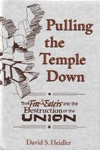Briskly written, thoughtfully presented, impeccably researched, Pulling the Temple Down offers not only a look at a group of discontented—and very ambitious—Southern would-be leaders, but also a case study in the workings of agitators and self-styled revolutionaries of all times. And in the end the author addresses the question that the careers of such men inevitably begs to have answered: Adept as they were at destroying, at "pulling down" an edifice, did they really have the ability to build something in its place?
Excerpt
The fire-eater was a renegade, not a conspirator, not a cooperator. The knowledge among political professionals that men like Rhett and Yancey could disrupt normal political intercourse in peacetime barred them from real avenues of power in war. Meanwhile, the rest of the South canted the liturgy of sectional nationalism, understanding little more than the fact that on distant fields percussion muskets already crackled in anger. Sarah Lois Wadley in Mississippi sat before her diary as her mother called to her for companionship on a stroll. Sarah, in her teens, filled her journal with the normal and obvious preoccupations universal to adolescent girls: boys, mainly, and sad fits of self-analysis and criticism. Sarah was short, thick, freckled, had a big nose, and was without the languorous eyes of the true belle. She cursed her towhead of hair that refused to hold the ringlets fashionable to her time. But here and there phrases like "spurn the yoke of the cowardly tyrant of the United States" appear, seeming strangely out of place, out of time. Near the end of June she noted that "affairs in Virginia remain the same, both parties are concentrating their forces but there has been no fight beyond a few slight Skirmishes"—which meant, of course, that men were already killing one another, doing what Governor Ellis had promised, “standing by each other to the death." The husbands, fathers, brothers, and sons surely believed, as did Sarah, that this was a "noble enterprise," but that was apart from the torrent of words that had been spewed forth by the Yanceys, Ruffins, Rhetts, Bennings, Wigfalls and all the rest. War, like secession, might have been nothing more than an idea whose time had come for the testing. Probably stout Sarah and those soldiers understood the why of it then no better than we do now. — Pulling the Temple Down: The Fire-Eaters and the Destruction of the Union
